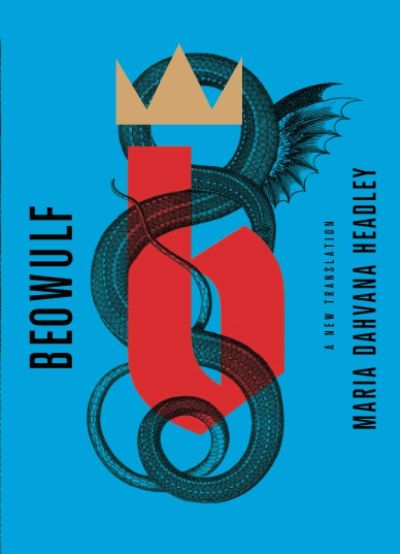Great Balls of Fire
Beowulf: A New Translation
By Maria Dahvana Headley

3 Jul, 2024
Maria Dahvana Headley’s 2020’s Beowulf: A New Translation is… a new translation of Beowulf. This is fortuitous, as it would be terribly confusing if a book titled Beowulf: A New Translation were not a new translation of Beowulf.
Nor do the book’s positive qualities end with the title. But first, hark back to old Scandinavia.
Heorot is the name of the great hall of Hrothgar, king of the Danes. Boisterous indeed are the warriors Hrothgar is hosting. Outcast Grendel finds this vexatious. Grendel expresses his displeasure by visiting the hall at night to rend warriors limb from limb. Nothing the warriors can do dissuades Grendel or saves his victims.
Beowulf is a great hero, which is to say a man whose wake is filled with carnage. Appealing to Beowulf is not without risk, but he might be able to deal with Grendel where others have failed. Without Beowulf, it seems the only thing that will stop Grendel’s rampage is the death of every warrior in Heorot. Therefore, Hrothgar sets Beowulf on Grendel.
Alas, poor Grendel.
Grendel’s mother is upset that Beowulf has murdered her son. She sets out for revenge. Beowulf is surely doomed—unless by some chance the venue for his final battle with Grendel’s mother happens to contain a giant’s sword perfect for dispatching angry mothers.
Five decades later, Beowulf, King of Geats, is confronted by a new crisis. A thieving slave, stumbling over a dragon’s hoard, filches a golden goblet. A furious dragon pours its flaming fury on the guilty or rather, unable to find the thief, on any unfortunate humans it can find.
Beowulf is worse off than Hrothgar. A dragon is far more fearsome than Grendel or Grendel’s mother. Beowulf has no hero to which he can turn. Beowulf can only rely on Beowulf and Beowulf is now an old man. Nevertheless, the Geat king sets out for a battle from which he will likely not return.
~oOo~
It’s not entirely true that Beowulf has nobody. Righteous Wiglaf1 stays with his king when every other warrior chooses prudence over bravery. Wiglaf’s courage isn’t matched by actual utility, as that would undermine the heroic narrative.
The above synopsis leaves out an important section of the book: Headley’s introduction. The first quarter of the book is commentary from the translator. Headley expounds on the poem, its origins, and the challenges and opportunities inherent in translating from one language to another. It’s not as if any languages have a one-to-one correspondence with each other. Not even with their predecessors. Every language evolves over time2.
Hence translation is not a mere mechanical process. It requires making choices. The choices made illuminate not just the original text but the person translating the original text. Different translators can produce very different works from the same original. Therefore, every translation is an opportunity.
Headley’s Beowulf employs less formal language than previous translations. To quote:
I come from the land of cowboy poets, and while theirs is not the style I used for this translation, I did spend a lot of time imagining the narrator as an old-timer at the end of the bar, periodically pounding his glass and demanding another. I saw it with my own eyes.
This translator is also more aware than some previous translators that women exist, which is why some book sellers call this a new feminist translation.
As previously stated, poetry and I don’t get along. I find poetry hard to parse. I dreaded this assignment. Foolish me, because I very much enjoyed this take on Beowulf. My only complaint is that I have this in ebook3 rather than on durable paper. This is an oversight easily addressed. Well, and also that I put this off so long. Learn from my mistake.
Beowulf: A New Translation is available here (Amazon US), here (Amazon Canada), here (Amazon UK), here (Apple Books), here (Barnes & Noble)4, here (Chapters-Indigo) and here (Words Worth Books)
1: Wiglaf was not flagged as misspelled. Is it in Word’s default dictionary or have I used it before?
2: Obligatory purity of the English language remark.
3: Specifically, what I read was a PDF e-arc. Epub would be better. Yes, one can convert PDFs to epubs, but e-arcs are DRMed (even the ones from publishers proudly announcing that their ebooks are not DRMed). Also, nasty things can happen when one converts PDFs to epub. For example, I once converted a non-DRMed PDF to epub, only to discover that each sentence now had its own page.
4: Barnes and Noble advertises that this translation won a Hugo, which strongly suggests that someone at B&N is aware of the Hugo Awards.
